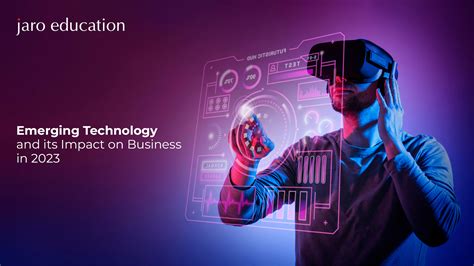Emergent technologies such as artificial intelligence (AI), blockchain, and the Internet of Things (IoT) are transforming industries in unprecedented ways. These technologies are not only disrupting traditional business models but also creating new opportunities for innovation and growth. In this article, we will explore five ways emergent tech is revolutionizing industries and what this means for businesses and individuals alike.
The Rise of AI-Powered Automation

One of the most significant ways emergent tech is impacting industries is through the use of AI-powered automation. AI algorithms can analyze vast amounts of data, identify patterns, and make predictions, making them ideal for automating repetitive and mundane tasks. This has enabled businesses to streamline their operations, reduce costs, and improve efficiency.
For example, in the manufacturing industry, AI-powered robots can perform tasks such as assembly, welding, and inspection with precision and speed. Similarly, in the healthcare industry, AI-powered chatbots can help patients with routine inquiries, freeing up human healthcare professionals to focus on more complex cases.
Benefits of AI-Powered Automation
- Increased efficiency and productivity
- Reduced costs and improved profitability
- Enhanced customer experience and satisfaction
- Improved accuracy and reduced errors
Blockchain Technology: Secure and Transparent Transactions

Blockchain technology is another emergent tech that is revolutionizing industries by enabling secure and transparent transactions. Blockchain is a decentralized, digital ledger that records transactions across a network of computers. This makes it virtually impossible to tamper with or alter the data, ensuring the integrity and security of transactions.
In the financial industry, blockchain technology is being used to facilitate cross-border payments, reduce transaction fees, and improve the speed of transactions. Similarly, in the supply chain industry, blockchain technology can be used to track the movement of goods, verify authenticity, and ensure compliance with regulations.
Benefits of Blockchain Technology
- Secure and transparent transactions
- Improved efficiency and reduced costs
- Enhanced accountability and compliance
- Increased trust and confidence in transactions
The Internet of Things (IoT): Connecting Devices and Enabling Innovation

The Internet of Things (IoT) is a network of physical devices, vehicles, and other items that are embedded with sensors, software, and connectivity, allowing them to collect and exchange data. This has enabled devices to interact with each other and with humans in new and innovative ways.
In the smart home industry, IoT devices such as thermostats, lighting systems, and security cameras can be controlled remotely, making it easier for homeowners to manage their energy consumption and improve their safety and security. Similarly, in the industrial sector, IoT devices can be used to monitor equipment, predict maintenance needs, and optimize production processes.
Benefits of IoT
- Increased efficiency and productivity
- Improved safety and security
- Enhanced customer experience and satisfaction
- New opportunities for innovation and growth
Virtual and Augmented Reality: Revolutionizing Entertainment and Education

Virtual and augmented reality technologies are revolutionizing the entertainment and education industries by providing immersive and interactive experiences. Virtual reality (VR) technology transports users to a completely digital environment, while augmented reality (AR) technology overlays digital information onto the physical world.
In the entertainment industry, VR and AR technologies are being used to create immersive gaming experiences, while in the education sector, they are being used to create interactive and engaging learning experiences.
Benefits of VR and AR
- Enhanced entertainment and educational experiences
- Increased engagement and participation
- Improved knowledge retention and understanding
- New opportunities for creativity and innovation
3D Printing: Revolutionizing Manufacturing and Healthcare

3D printing technology is revolutionizing the manufacturing and healthcare industries by enabling the rapid creation of complex objects and customized products. 3D printing technology works by layering materials such as plastics, metals, and ceramics to create a physical object from a digital design.
In the manufacturing industry, 3D printing technology can be used to create customized parts and products, reducing production time and costs. Similarly, in the healthcare industry, 3D printing technology can be used to create customized implants, prosthetics, and surgical models.
Benefits of 3D Printing
- Rapid creation of complex objects and customized products
- Reduced production time and costs
- Improved accuracy and precision
- New opportunities for innovation and growth






In conclusion, emergent technologies such as AI, blockchain, IoT, VR, and 3D printing are revolutionizing industries in unprecedented ways. These technologies are not only disrupting traditional business models but also creating new opportunities for innovation and growth. As we move forward, it is essential for businesses and individuals to stay ahead of the curve and leverage these technologies to drive success.
What is emergent technology?
+Emergent technology refers to new and innovative technologies that are transforming industries and revolutionizing the way we live and work.
How is AI-powered automation impacting industries?
+AI-powered automation is streamlining operations, reducing costs, and improving efficiency in industries such as manufacturing, healthcare, and finance.
What is the future of work in the age of emergent technology?
+The future of work will be shaped by emergent technologies such as AI, blockchain, and IoT, which will create new job opportunities and require workers to develop new skills.
